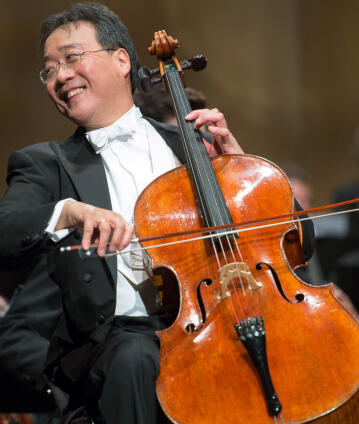Manfred Honeck and Yo-Yo Ma at the Easter Festival

In this concert from the 2016 Easter Festival, Manfred Honeck conducts Robert Schumann’s Cello Concerto with Yo-Yo Ma as the soloist, and Tchaikovsky’s Pathétique – Romantic late works which could hardly be more contrasting. While Schumann in his work finds his way to contemplation and inward singing, Tchaikovsky in his last symphony aggressively bares his pain as his pride to the listener.
Piotr Ilyich Tchaikovsky felt a deep connection to the works of Robert Schumann. In the 1870s, he wrote: “The music of Robert Schumann [...] opens up a whole world of new musical forms, tugs at strings that not even his great predecessors touched.” The audience of the Berliner Philharmoniker was able to convince itself of the relationship between the two composers in this concert from the Easter Festival in Baden-Baden which juxtaposes two late works of Schumann and Tchaikovsky.
Originally designating his only cello concerto as a “Concert Piece for Cello with orchestral accompaniment”, Schumann already indicates that here, the collective should withdraw while gently supporting the wistful singing of the soloist. However, again and again, the monologue of the cello – for example in the motif in fifths in the slow movement – develops into an inner dialogue with Robert’s wife, Clara. In terms of form, the transition to the finale, which Schumann creates from a combination of the main themes of the first two movements, is particularly unusual.
While Schumann’s Cello Concerto was never played publicly during his lifetime, Tchaikovsky died just nine days after the premiere of his Sixth Symphony. The Pathétique has often been interpreted as a musical autobiography. An originally elaborate written programme was, however, later withdrawn by Tchaikovsky, allowing the symphony, like all great music, to speak for itself and transcend any biographical aspect.
Manfred Honeck, currently musical director of the Pittsburgh Symphony Orchestra, made his successful debut with the Berliner Philharmoniker in 2013, followed by a joint CD recording with Anne-Sophie Mutter with works by Antonín Dvořák. The cellist Yo-Yo Ma has worked with the Berliner Philharmoniker since 1978.
© 2016 EuroArts Music International
Related interviews
Category
Artists
Our recommendations
- Simon Rattle conducts the 2016 Europakonzert in Røros
- 2010 Europakonzert from Oxford with Daniel Barenboim and Alisa Weilerstein
- Simon Rattle conducts Mozart and Haydn in Lucerne
- Kirill Petrenko conducts Strauss’s “Elektra” at the Easter Festival in Baden-Baden
- Europakonzert 2011 from Madrid with Simon Rattle and Cañizares
- The 1995 Europakonzert from Florence with Zubin Mehta and Sarah Chang